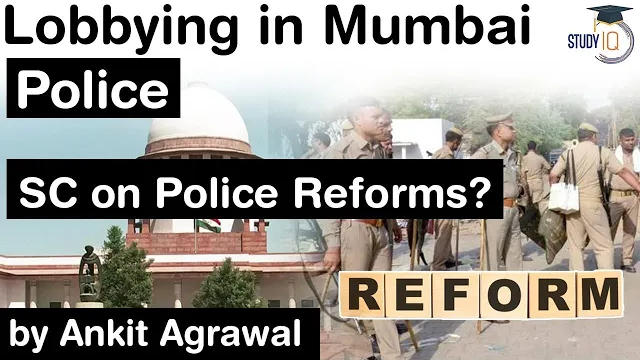Table of Contents

What has happened?
- Political interference in police postings continues despite the landmark Prakash Singh judgment nearly decade-and-a-half ago that addressed the issue and was pegged to be a watershed moment in police reforms.
- The latest episode of allegations of lobbying by several IPS officers in Maharashtra and of ‘power brokers’ deciding on postings in cahoots with the government shows little has changed in the system.
What is the SC’s Prakash Singh judgment on police reforms?
- Prakash Singh, who served as DGP of UP Police and Assam Police besides other postings, filed a PIL in the Supreme Court post retirement, in 1996, seeking police reforms.
- In a landmark judgment, the Supreme Court in September 2006 had directed all states and Union Territories to bring in police reforms.
- The ruling issued a series of measures that were to be undertaken by the governments to ensure the police could do their work without worrying about any political interference.
What measures were suggested by the SC?
- The seven main directives from the Supreme Court in the verdict were-
- Fixing the tenure and selection of the DGP to avoid situations where officers about to retire in a few months are given the post.
- In order to ensure no political interference, a minimum tenure was sought for the Inspector General of Police so that they are not transferred mid-term by politicians.
- The SC further directed postings of officers being done by Police Establishment Boards (PEB) comprising police officers and senior bureaucrats to insulate powers of postings and transfers from political leaders.
- Further, there was a recommendation of setting up State Police Complaints Authority (SPCA) to give a platform where common people aggrieved by police action could approach.
- Apart from this, the SC directed separation of investigation and law and order functions to better improve policing,
- Setting up of State Security Commissions (SSC) that would have members from civil society and forming a National Security Commission.
How did states respond to these directives?
- The Commonwealth Human Rights Initiative (CHRI), in its report on September 22, 2020 that tracked changes made in the police force following the 2006 judgment,
- Found that not even one state was fully compliant with the apex court directives and that while 18 states passed or amended their Police Acts in this time, not one fully matches legislative models.
How has Maharashtra’s track record been?
- The Maharashtra government under former Chief Minister
- Devendra Fadnavis passed the Maharashtra Police (Amendment and Continuance) Act, 2014
- That was meant to incorporate the changes suggested in the Prakash Singh judgment.
- Recently, former Maharashtra State Intelligence Department Commissioner Rashmi Shukhla forwarded a document to Chief Minister Uddhav Thackeray alleging rampant political interference in transfers.
If the Maharashtra government made the necessary changes, why has the situation not improved?
- The new Maharashtra Police Act had been criticised for being “flawed” and only making piecemeal changes to save themselves from the ire of the Supreme Court that was pulling up states that had not followed its directives.
- However, Prakash Singh told that the state Acts were deliberately formulated in such a way that “it just gave legal garb to the status quo that existed before”.
- In the updated Maharashtra Police Act of 2014, a section 22(N)(2) had been added that gave the CM special powers to transfer officers at any point in case of ‘administrative exigencies’.
- Thus, while the SC directive was that an officer should not be transferred before the given tenure, CM’s have used this section for mid-term transfer thereby maintaining control on transfers.
- The recent transfer of the former Mumbai Police Commissioner Param Bir Singh too was done under this section.
How has the government interfered in postings and transfers when there are Police Establishment Boards (PEB)?
- The officers on the committee are ‘unofficially’ informed by the government about which officer would be preferred for which post.
- Among five officers, even if one or two do not agree, the majority usually sides with what the postings that the government of the day is interested in.
- Thus in spite of PEB’s in place, the system has continued as before.
What has been the response of the SC?
- Prakash Singh said that he has followed up on these issues and has had nearly five contempt petitions issued in the past decades to states found to be non-compliant.
- Singh said that bigger states like Maharashtra, Tamil Nadu and UP have been the worst when it comes to bringing about systemic changes in line with the judgment and that,
- It is only the North-Eastern states that have followed the suggested changes in spirit.
- Singh said states like Maharashtra make their own laws that are not effective.
- The need of the hour is an all-India Act that all states have to follow and small changes can be made in exceptional cases relating to the situation in a particular state.
Q) Who among the following relieved the zamindars of their police duties?
- Lord Bentinck
- Lord Cornwallis
- Warren Hasting
- Lord Wellesley
Latest Burning Issues | Free PDF






















 WhatsApp
WhatsApp